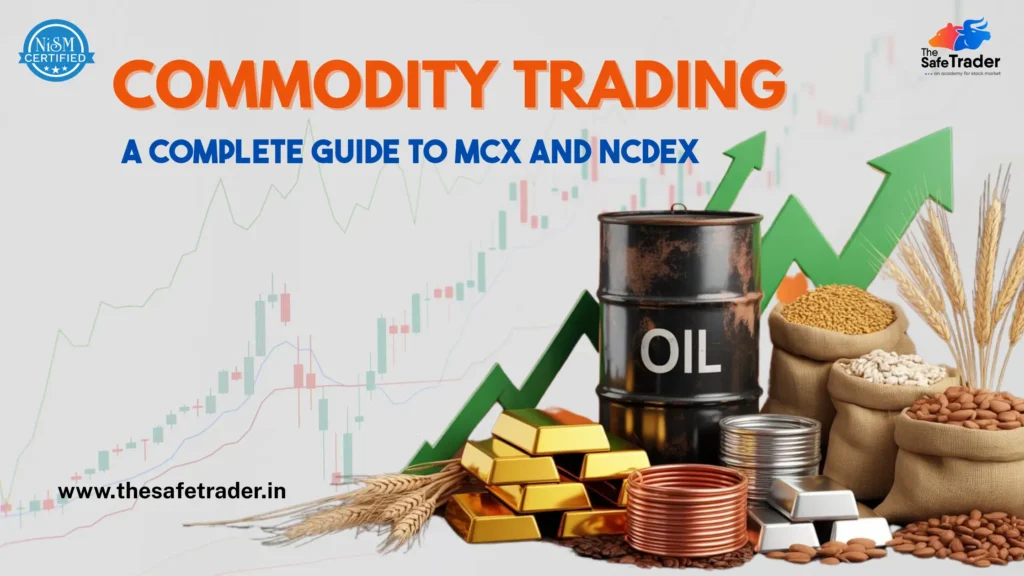Commodity Trading in India

Commodity trading has become an integral part of India’s financial infrastructure, providing traders with means to hedge risk, diversify portfolios, and capitalize on global market movements. Unlike the stock exchange where shares of companies are traded, commodity trade is concerned with tangible goods like metals, energy, and agricultural produce. This guide will walk you through commodity trading, the Indian major exchanges-MCX and NCDEX, and lots of other key points like lot sizes and market timings, which are essential to legion into your successful commodity trading venture in India. What is Commodity Trading? The practice of trading is buying and selling raw materials or primary goods on spot or derivatives markets (largely futures and options).The broad classification of commodities includes: Hard Commodities: Metals, energy (gold, crude oil) Soft Commodities: Agricultural products (wheat, cotton) Major Commodity Exchanges in India: MCX vs NCDEX MCX (Multi Commodity Exchange of India Ltd.) Established: 2003 Headquarters: Mumbai Regulator: SEBI Focus: Non-agricultural commodities (metals, energy) Popular Commodities Traded on MCX: Bullion: Gold, Silver Energy: Crude Oil, Natural Gas Base Metals: Copper, Aluminium, Zinc, Nickel, Lead NCDEX (National Commodity & Derivatives Exchange) Established: 2003 Headquarters: Mumbai Regulator: SEBI Focus: Agricultural Commodities Popular Commodities Traded on NCDEX: Soybean, Mustard Seed, Chana, Cotton Seed Oil Cake, Turmeric, Jeera, Guar Gum, Barley Commodity Segments on MCX & NCDEX Exchange Segment Examples MCX Bullion Gold, Silver Base Metals Copper, Zinc, Aluminium Energy Crude Oil, Natural Gas NCDEX Agriculture Wheat, Soybean, Mustard, Turmeric Detailed Commodity Segments: Mega, Mini & Micro Contracts on MCX & NCDEX Commodity trading offers flexibility in terms of contract sizes to cater to different types of participants—from large institutions to small retail traders. Contracts are typically categorized as Mega, Mini, and Micro based on their lot size and margin requirements. Here’s a breakdown of the major traded commodities on MCX and NCDEX with their variants: 1. Gold (MCX) Gold is the most actively traded commodity in India, widely used for investment, jewelry, and as an inflation hedge. Contract Type Symbol Lot Size Margin (Approx.) Use Case Mega GOLD 1 kg ₹2.5–₹3 lakh Institutional traders Mini GOLDM 100 gm ₹25,000–₹30,000 Mid-size traders Micro GOLDPETAL 1 gm ₹200–₹300 Small/retail traders Micro GOLGUINEA 8 gm ₹1,800–₹2,500 Gold savings, gifting Expiry: 5th of every month (or preceding business day) 2. Silver (MCX) Silver is an industrial and investment metal with high volatility and liquidity. Contract Type Symbol Lot Size Margin (Approx.) Use Case Mega SILVER 30 kg ₹1.8–₹2.5 lakh Professionals/institutions Mini SILVERM 5 kg ₹30,000–₹50,000 Retail swing traders Micro SILVERMIC 1 kg ₹6,000–₹10,000 Low-cap retail traders Expiry: 5th of every month (or preceding business day) 3. Crude Oil (MCX) Crude oil is the lifeblood of the global economy and highly sensitive to geopolitical events. Contract Type Symbol Lot Size Margin (Approx.) Use Case Mega CRUDEOIL 100 barrels ₹2.5–₹3 lakh Large traders, institutions Mini CRUDEOILM 10 barrels ₹25,000–₹30,000 Short-term retail traders Expiry: 19th of the month or the preceding business day Note: Crude oil is highly volatile—risk management is essential. 4. Natural Gas (MCX) A key energy commodity, used in industrial and household consumption. Priced in mmBtu (Million British Thermal Units). Contract Type Symbol Lot Size Margin (Approx.) Use Case Standard NATURALGAS 1,250 mmBtu ₹50,000–₹75,000 Volatility traders Mini NATURALGASM 250 mmBtu ₹10,000–₹15,000 Small lot participants Expiry: Last business day of the month 5. Copper (MCX) Used heavily in industrial manufacturing, copper prices reflect global industrial health. Contract Type Symbol Lot Size Margin (Approx.) Use Case Standard COPPER 1 MT (1000 kg) ₹1.5–₹2 lakh Hedgers and traders Mini COPPERM 250 kg ₹35,000–₹50,000 Smaller risk appetite Expiry: Last business day of the month Other Base Metals on MCX Commodity Symbol Lot Size Remarks Zinc ZINC 5 MT Also available as ZINCMINI (1 MT) Aluminium ALUMINIUM 5 MT Liquid metal with industrial demand Lead LEAD 5 MT Used in batteries Nickel NICKEL 250 kg High-value industrial metal Select NCDEX Agri Commodities Agri commodities do not have “Mini” or “Micro” formats but have standardized lot sizes: Commodity Symbol Lot Size Seasonal Impact Soybean SOYBEAN 10 MT Yes (Monsoon, harvest) Mustard Seed RMSEED 10 MT Yes Turmeric TURMERIC 5 MT Yes Jeera (Cumin) JEERA 3 MT Yes Chana (Gram) CHANA 10 MT Yes Cotton Seed Cake COTTONCAK 5 MT Yes Expiry: 20th of the month (or preceding business day) Why Mega, Mini, and Micro Contracts Matter? Contract Type Best For Key Benefit Mega Institutional, Hedgers Lower transaction cost per unit Mini Experienced retail traders Flexible capital usage Micro Beginners, low-cap traders Minimal risk exposure Pro Tip: Mini and Micro contracts are ideal for learning, testing strategies, and reducing exposure during volatile markets. Would you like a visual table/infographic to represent this section for your blog? I can prepare one for better engagement and SEO. Market Timings MCX Market Timings NCDEX Market Timings Note: Evening session on MCX aligns with global markets like NYMEX and LME. Lot Size in Commodity Trading Lot size refers to the standardized quantity for each futures contract. Here are a few examples: Commodity Exchange Lot Size Gold MCX 1 kg / 100g (Mini) Silver MCX 30 kg Crude Oil MCX 100 barrels Copper MCX 1 metric ton Soybean NCDEX 10 MT Mustard Seed NCDEX 10 MT Expiry Days of Commodity Contracts Futures contracts have a monthly expiry, though some may have weekly or bi-monthly durations. Traders should exit or roll over positions before expiry to avoid physical delivery unless they’re hedgers or institutions. Types of Futures Contracts Standardized contracts to buy/sell a specific commodity at a predetermined price in the future. Available in select commodities on MCX (e.g., Gold, Crude Oil), offering limited-risk opportunities. Smaller variants for retail participation—especially in Gold and Silver. Commodity Indexes in India Commodity indexes track price movements across a basket of commodities. MCX iCOMDEX Series: These indexes are used to track performance and may form the basis of index-based products. Advantages of Commodity Trading Best Time to Trade Commodities Factors Impacting Commodity Markets How Are Commodity Markets Different from Equity Markets? Feature Commodity Trading Equity Trading Asset Physical goods
